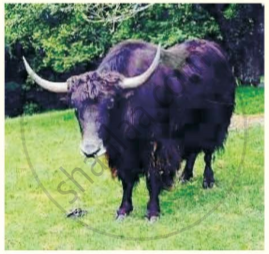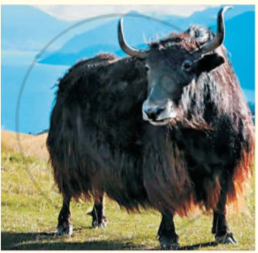Advertisements
Advertisements
प्रश्न
Imagine that you are conducting a research on the conservation of a few animal species in India. You have been asked by the Wildlife Trust of India to prepare a report on the future of the YAK that lives in the Ladakh region of the Himalayan mountains . In groups of four, discuss the issue and make notes for your report. Refer to the Question 2 and the information in the box given here.

| DOMESTIC YAK |
| herd animals 2-2.2 m tall |
| used in sports |
| kept for milk , fur , fibre , meat , drawing ploughs etc |

| WILD YAK |
| length:3-3. 4m |
|
habitat: treeless uplands
|
| killed for food |
| insulated from cold by dense, close matted under hair , shaggy outer hair |
| hunted for similar reasons as the domestic ones |
Within your group, discuss
• What is the problem? How has it arisen?
• What is the best way to preserve these species?
• Why do we need to preserve these species?
• What values need to be inculcated in the hearts of human beings? Why?
• What actions would you recommend to the World Wildlife Federation?
• How is global warming affecting these species?
उत्तर
A : Yaks are found in the Himalayan uplands. Domestic yaks are about 2 – 2.2 metre tall, while the wild ones are bigger measuring about 3 – 3.4 metre. How do they preserve themselves?
B: They have thick fur all over their body. The fur acts as insulation and keeps them warm in the extreme cold temperatures of the Himalayas. Why do we need to preserve them?
C: Domestic yak is used for milk, fur, meat and farming related work. They are also used as sports. The wild variety is poached for its fur and meat. What dangers do they face?
D : Because of increasing human activities around yak’s habitat they are facing extreme danger of becoming endangered. The growing pollution level and related global warming has resulted in melting of the Himalayan glaciers. This may reduce the habitable area for yak. What actions would you recommend to save them?
A: Like any other animal, yak is also part of the important food chain and helps maintain the ecological balance of the Himalayan region. An awareness programme should be undertaken to educate people about the values associated with yak. They also give unique identity to the Himalayan fauna. People’s participation can give wonderful results as has been seen in the case of black bucks of Rajasthan.
B: Some sanctuary should be earmarked for them on the lines of sanctuaries meant for tigers and rhinos. This will help in carrying out proper steps to preserve one of the important species of the Himalayan region.
APPEARS IN
संबंधित प्रश्न
Answer the following question briefly:
How did Private Quelch manage to anger the Corporal?
Answer the following questions:
Why has the word ‘chatter’ been repeated in the poem?
Imagine that a Social Worker comes to the abandoned farmhouse to find out what may have happened to the family. She makes the following observations in her note-pad
| Clues | Conclusions |
| empty house | Have they left? Where could they have gone to? |
| boulders in the field , leaky barn | The owner might not have been a farmer. |
| sealed jars in the cellar | A woman lived there - family short of money left in a hurry |
| toys scattered in the yard | Something went wrong????? |
On the basis of these notes, the Social Worker presents the facts as she sees them to her Head of Department. Unfortunately, she spills ink on her report. Complete her report.
When I reached the farmhouse , I saw that the house was empty , which ........ I wondered where they might have gone . .................. the owner was not a farmer , because of the boulders in the field and the leaky barn .............. the family was poor , because I saw several sealed jars in the cellar . Also ............ a woman lived there . It was obvious she had left in a hurry . what was most touching was that the toys were scattered in the yard .
Read the following extracts and answer the question that follow by choosing
the .correct options.
'While you were upstairs, I have been thinking a lot about your Papa and Mamma.
(a) What is the discrepancy between what Gaston said earlier and what he says now?
(i) Earlier he did not want Juliette's parents to stay with them but now he is
showing concern for them.
(ii) Earlier he wanted Juliette's parents to stay with them but now he does not want
them to come over.
(iii) Earlier he wanted to buy a house for them but how he wants them to come and
stay in their villa.
(iv) Earlier he stayed in Juliette's parents' villa but now he wants them to stay with
him and Juliette.
(b) What does the above statement reveal about Gaston's character?
(i) he is selfish.
(ii) he is an opportunist.
(iii) he is a caring person.
(iv) he is a hypocrite.
The convict is the product of the society he had lived in, both, in terms of the
suffering that led him to steal a loaf of bread, as well as the painful sentence he
received as a punishment for his "crime". He was imprisoned for stealing money
to buy food for his sick wife. This filled him with despair, hopelessness,
bitterness and anger at the injustice of it all.
Conduct a debate in the class (in groups) on the following topic. Instructions for
conducting a debate and use of appropriate language are given in the unit “Children” of
the Main Course Book.
'Criminals are wicked and deserve punishment'
Make five promises to your friend expressing your willingness to do something.
Use shall/will
e.g. I shall never be late to school.
Promises to Keep!
Did you Know?
One of the puzzling things in English is to know when to use shall and when to use will.
Whenever we desire to express some command, promise, threat or determination shall is used in the second and third person and will is used in the first person.
He shall not enter the lab again, (determination)
I will reward her for her diligence, (promise)
I will report to the Principal if you don’t submit your homework, (threat)
I will never use abusive language, (determination)
While you were away on holiday, your house was burgled. Write a letter to
your friend to tell him or her about it.
Use the underlined expressions in Column A above to help you. Include ...
1. how the burglar could have got in,
2. how he knew you had gone away, and
3. what you could have done to prevent the burglary.
Study the following sentences. Select the one underlined word which is incorrect. Write the incorrect answer in the boxes provided. One has been done as an example.
e.g. The National Gallery of Art at Washington D.C., is one of the world’s greatest museums.
| at |
(a) Millions of people had entered its doors to see the paintings by some of the world’s finest artists
(b) But if, those priceless masterpieces are to be preserved, the gallery must protected them carefully.
(c) The 150 guards have successively prevented damage and theft.
(d) But, protecting the paintings from nature was a greater problem.
Past passive –
“Where was it made?”
Look at what your partner is wearing. Imagine where the various items of clothing were (or might have been) made, and tell your partner. Use your imagination!
e.g. A : Was your shirt made in France ?
B : No, actually it was made in Brazil.
Look at the notes below. Then use the information to complete the paragraph by choosing a suitable word or phrase in each space.
Bishnois – always – nature worshippers – 1730 A.D. – Maharja Abhay Singh’s men – fell – khejri trees – Amrita Devi – hug a tree – protested – insisted – to cut her head first – men obliged – Amrita – a legend.
Bishnois have (a) ____________. In 1730 A.D. Maharaja Abhay Singh’s (b) ____________ fell Khajri trees. Amrita Devi, a true Bishnoi, (c) ____________ and expressed (d) ____________. She insisted that if they wanted to cut the tree (e) ____________. The unrelenting men of the Maharaja obliged her and the (f) ____________.
| (a) (i) always been regarded as nature worshippers (ii) always been called as nature worshippers (iii) always knew nature worshippers (iv) always done nature worshippers |
(b) (i) men coming to (ii) men started (iii) men began to (iv) men came to |
(c) (i) hug a tree (ii) hugging a tree (iii) hugged a tree (iv) hugs a tree |
| (d) (i) his protest (ii) her protest (iii) their protest (iv) protesting |
(e) (i) they may cut her head first (ii) they would have to cut her head first (iii) they can cut her head first (iv) they should cut her head first |
(f) (i) woman became a legend (ii) woman becomes a legend (iii) women became a legend (iv) woman read a legend |
